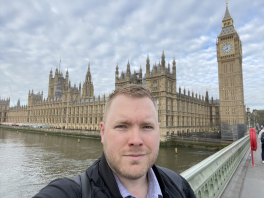Matthew Childs
Keywords: Catastrophe - Energy - Value
Affiliation: Wake Forest University

In his primary area of research, Matthew is interested in how catastrophe undergoes shifts and constancies in its representation and conceptual design, and how this affects the social and political imaginary. His current book project, Catastrophe and Critique: A Dialectic of German Modernity, centers on the development of the catastrophe concept from the 1755 Lisbon Earthquake to World War II, examining works from (among others) Goethe, Kleist, and Kant to Benjamin, Arendt, and Koselleck. With notable exceptions, for much of the eighteenth and nineteenth century catastrophes are exceptional (and frequently natural) events that disrupt the status quo, inviting the critique of systems that structure common experience and opening the possibility of reform or even revolution. By the early-twentieth century, catastrophes are theorized to have become the status quo, preventing critique and encouraging devolution into forms of totalitarianism.
In addition to his book project, he is a co-editor and contributor to the volume Critical Catastrophe Studies, which tracks the interrelation and evolution of catastrophe and critique from Ancient Greece to the present-day (as well as near and possible futures). He is also the author of the recently published essay in On_Culture, “The Value of Literature: The Discard of Society in Wilhelm Raabe’s Pfisters Mühle: Ein Sommerferienheft,” which uses Michael Thompson’s rubbish theory to explore the novel’s theorizing of shifts in social values. He also has projects examining the representation and symbolism of sugar in Raabe’s late works of fiction and their broader connection to caloric energy as a repository of cultural value.
